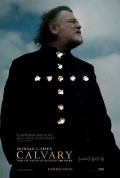
Directed by
John Michael McDonagh
100 minutes
Rated MA
Reviewed by
Bernard Hemingway

Calvary
Synopsis: During a confession, a priest (Brendan Gleeson) is told by one of his parishioners that he must die in order to expiate the sexual abuse inflicted on the parishioner as a child by a now-dead colleague.
Calvary is a black comedy about the impact of the sex abuse revelations on the Catholic Church in Ireland. It is a film that comes to us with glowing praise but although clever, it is a little too clever for its own good.
The core premise, presented in the opening confessional scene, in which Father James is told that he must die in order to atone for the sins of one of his colleagues, his innocence being the only just price, is a gripping one. It goes straight to the question of guilt and the genuineness of the Church’s response to the systemic abuse which has for many of the once-faithful, destroyed its credibility forever. As a representative of the Church, Father James is certainly not of a mind to plead innocence. And so we have a neat set-up for what could have been a probing film.
The thing which undermines Calvary in this respect is that the world which Father James inhabits is not the real world in which the abuse took place but some typological hamlet cooked up in McDonagh’s imagination – a kind of tele-serial universe in which a gaggle of misfits and eccentrics, male and female, use every contact with Father James to toss off some archly cynical observation about his priestly role (and thereby also keep us guessing about the identity of the would-be assassin) which he good-naturedly shrugs off with world-weary forbearance as he does his rounds, a surprising number of which for a man of the cloth who doesn't drink, end up in the pub (but maybe that's an Irish thing).
McDonagh seamlessly integrates his anti-clerical barbs into the narrative, which is divided into the seven days from Sabbath to Sabbath as Father James endures his own private via dolorosa. All this makes for amusing badinage but when Dylan Moran turns up on a horse in full dressage it starts to get a little wearing. Death, one might think Father James would ask, where is thy sting? At one point a doctor (Aiden Gillen) at the local hospital with a particularly virulent hatred of the Church describes his sense of style as “one part humanism to nine parts gallows humour”. The self-consciousness of that observation is also very much the nature of the film and it is a quality that tends to make us lose sight of the film’s emotional core – Father James's confrontation with death - to which McDonagh only returns towards the film's end, albeit strongly so (bar a seemingly irrelevant coda)
Brendan Gleeson, teaming up again with McDonagh after The Guard, is well-cast in the central role and McDonagh has fashioned a credible portrait of a man and his vocation - a kind of distaff version of Bresson’s Diary Of A Country Priest (or perhaps, less generously,The Vicar Of Dibley). The only problem is that one cannot help but feel that it could have been a much more powerful film if only McDonagh hadn’t indulged himself quite as much in outrageous characters and sardonic sallies and instead teased out more of the potential emotional texture of his scenario.

Want more about this film?


Want something different?




